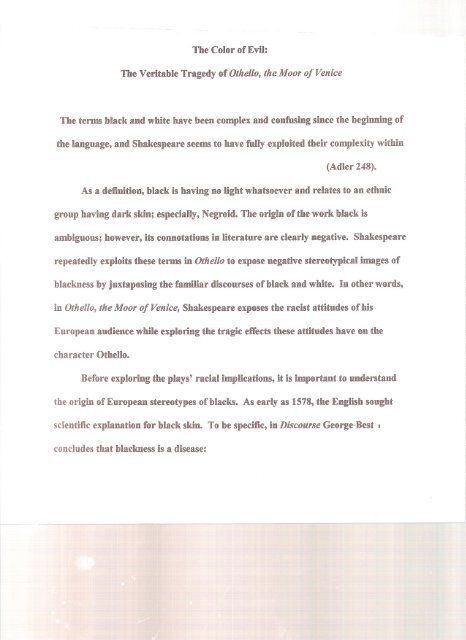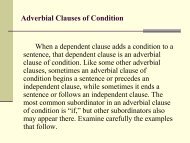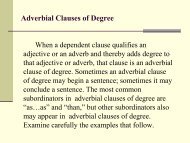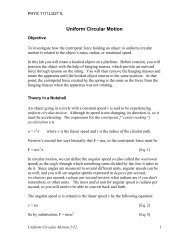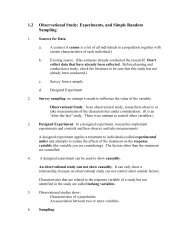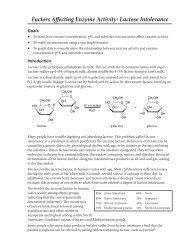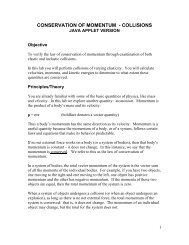The Color of Evil: The Veritable Tragedy of Othello, the Moor of ...
The Color of Evil: The Veritable Tragedy of Othello, the Moor of ...
The Color of Evil: The Veritable Tragedy of Othello, the Moor of ...
Create successful ePaper yourself
Turn your PDF publications into a flip-book with our unique Google optimized e-Paper software.
<strong>The</strong> <strong>Color</strong> <strong>of</strong> <strong>Evil</strong>:<br />
<strong>The</strong> <strong>Veritable</strong> <strong>Tragedy</strong> <strong>of</strong> <strong>O<strong>the</strong>llo</strong>, <strong>the</strong> <strong>Moor</strong> <strong>of</strong> Venice<br />
<strong>The</strong> terms black and white have been complex and confusing since <strong>the</strong> beginning <strong>of</strong><br />
<strong>the</strong> language, and Shakespeare seems to have fully exploited <strong>the</strong>ir complexity within<br />
(Adler 248).<br />
As a definition, black is having no light whatsoever and relates to an ethnic<br />
group having dark skin; especially, Negroid. <strong>The</strong> origin <strong>of</strong> <strong>the</strong> work black is<br />
ambiguous; however, its connotations in literature are clearly negative. Shakespeare<br />
repeatedly exploits <strong>the</strong>se terms in <strong>O<strong>the</strong>llo</strong> to expose negative stereotypical images <strong>of</strong><br />
blackness by juxtaposing <strong>the</strong> familiar discourses <strong>of</strong> black and white. In o<strong>the</strong>r words,<br />
in <strong>O<strong>the</strong>llo</strong>, <strong>the</strong> <strong>Moor</strong> <strong>of</strong> Venice, Shakespeare exposes <strong>the</strong> racist attitudes <strong>of</strong> his<br />
European audience while exploring <strong>the</strong> tragic effects <strong>the</strong>se attitudes have on <strong>the</strong><br />
character <strong>O<strong>the</strong>llo</strong>.<br />
Before exploring <strong>the</strong> plays' racial implications, it is important to understand<br />
<strong>the</strong> origin <strong>of</strong> European stereotypes <strong>of</strong> blacks. As early as 1578, <strong>the</strong> English sought<br />
scientific explanation for black skin. To be specific, in Discourse George'Best I<br />
concludes that blackness is a disease:<br />
- - - - --
I my selfe have seen an Ethiopian as blacke as cole brought into<br />
England who taking a faire English woman to wife, begat a soone in aU<br />
respects as black as <strong>the</strong> fa<strong>the</strong>r was, although England were his native<br />
countrey, and an English woman his mo<strong>the</strong>r: whereby it seemeth this<br />
blacknes proceedeth ra<strong>the</strong>r <strong>of</strong> some natural infection <strong>of</strong> that man, which<br />
was so strong, that nei<strong>the</strong>r <strong>the</strong> nature <strong>of</strong> <strong>the</strong> Come, nei<strong>the</strong>r <strong>the</strong> good<br />
complexion <strong>of</strong> <strong>the</strong> mo<strong>the</strong>r concurring, could and thing alter<br />
(Newman 143).<br />
Certainly, this man's blacknessis not natural, nei<strong>the</strong>r is it a thing to be desired; his<br />
blacknes is an unfortunate freak <strong>of</strong> nature.<br />
More specifically, it is a sickness,<br />
transferred to his son in spite <strong>of</strong> his mo<strong>the</strong>r's fair skin. Thus, as Europeans<br />
attempted to scientifically explain <strong>the</strong> cause <strong>of</strong> blackness, <strong>the</strong> common assumption<br />
was that blackness was indeed a sickness or a deficiency.<br />
Consequently, Shakespeare manipulated this discourse in m@agedY,<br />
<strong>O<strong>the</strong>llo</strong>, <strong>the</strong> <strong>Moor</strong> <strong>of</strong> Venice.<br />
Shakespeare not only employed various meanings <strong>of</strong> <strong>the</strong> terms and <strong>the</strong>ir<br />
connotations literaBy and metaphorically, but also persistently<br />
applied <strong>the</strong> connotations <strong>of</strong> <strong>the</strong> meanings <strong>of</strong> black to ano<strong>the</strong>r meaning <strong>of</strong><br />
black. In addition, <strong>the</strong> confalted and confusing values <strong>of</strong> black that<br />
-- -- - --- -- - -
esulted from this treatment are heightenedby a similar treatment <strong>of</strong><br />
<strong>the</strong> opposite values <strong>of</strong> white, or more <strong>of</strong>ten fair. (Adler 248).<br />
Thus, Shakespeare's O<strong>the</strong>lltOmvestigates <strong>the</strong> numerous myths about blackness while,<br />
at <strong>the</strong> same time, exposing <strong>the</strong> presumption that white suggests purity.<br />
In <strong>the</strong> play, Shakespeare suggests several negative implications <strong>of</strong> <strong>the</strong> term<br />
black. First, <strong>O<strong>the</strong>llo</strong>'s African heritage contrasts£)us European counterparts: "To a<br />
great many people <strong>the</strong> word 'negro' suggests at once <strong>the</strong> picture <strong>of</strong> what <strong>the</strong>y would<br />
call a 'nigger' <strong>the</strong> wooly hair, thick lips, round skull, bunt features, and burnt-cork<br />
blackness <strong>of</strong> <strong>the</strong> traditional minstrel" (Newman 143). Undoubtedly, Shakespeare's<br />
audience would have been familiar with nigger imagery; however, <strong>the</strong> playwright<br />
debunks this stereotype as Desdemona falls in love with and soon marries <strong>O<strong>the</strong>llo</strong>, <strong>the</strong><br />
<strong>Moor</strong>.<br />
Secondly, blackness is related to filthiness. <strong>O<strong>the</strong>llo</strong> himself suggests that if his<br />
wife has had, in fact, an adulterous relationship, her name is as black as his face:<br />
By <strong>the</strong> world,<br />
I think my wife be honest, and think she is not.<br />
I think that thou are just, and think thou are not.<br />
I'll have some pro<strong>of</strong>. My name, <strong>the</strong> was as fresh<br />
As Dian's visage, is now begrimed and black<br />
as my own face. (III. ill.389-93)<br />
---"""""""'"."
Certainly, <strong>the</strong> myth that black is inevitably Unked to dirtiness is evident as <strong>O<strong>the</strong>llo</strong><br />
chllUngly compares his own blackness to deception, adultery, and evil.<br />
f<br />
Just as Best concludes that blackness~Unked to disease, negative black<br />
stereotypes Unk black to immorality. <strong>The</strong>se negative myths about blackness are<br />
fur<strong>the</strong>r played out in <strong>O<strong>the</strong>llo</strong>.<br />
Specifically, Shakespeare plays on <strong>the</strong> falsehood that<br />
black men are lascivious warlocks who possess a violent sexual nature, and are<br />
inferior to Europeans (Adler 249). To be specific, <strong>O<strong>the</strong>llo</strong>'s does not even enter untU<br />
<strong>the</strong> second scene, yet <strong>the</strong> audience has already been swayed by lago's slander. As<br />
Iago warns Desdemona's fa<strong>the</strong>r <strong>of</strong> her unnatural marriage to a <strong>Moor</strong>, <strong>O<strong>the</strong>llo</strong> is<br />
presented as a dark beast who has stolen <strong>the</strong> senator's daughter:<br />
Swounds sir, you are one <strong>of</strong> those that will<br />
not serve God if <strong>the</strong> devil bid you. Because we come to do you<br />
service and you think we are ruffians, you'll have your daughter<br />
covered with a Barbary horse, you'll have your nephew neigh<br />
to you, you'll have coursers for cousins and jennets for germans...<br />
I am one,sir, that comesto tell you your daughter and <strong>the</strong><br />
<strong>Moor</strong> are now making <strong>the</strong> beast with two backs. (I. 1.110-18)<br />
Clearly, lago anticipates <strong>the</strong> senator's anger and disgust because not only has<br />
Barbanzio's daughter married without permission, but she also has eloped with a<br />
black <strong>Moor</strong>. Moreover, lago fur<strong>the</strong>r darkens <strong>the</strong> unfortunate news by suggesting<br />
---
that Desdemona's relationship is bestial, for she has not consummated her marriage<br />
with a man, but with a horse. Thus, <strong>the</strong> myth that black men are lascivious is<br />
explored in <strong>the</strong> first Act One <strong>of</strong> <strong>the</strong> tragedy.<br />
Fur<strong>the</strong>rmore,<br />
Shakespeare examines <strong>the</strong> stereotype that "black" men are<br />
,~ I'<br />
magical and practice <strong>the</strong> forbidden art, which is ironically termed black magic. For<br />
instance, when Barbanzio confronts <strong>O<strong>the</strong>llo</strong> about <strong>the</strong> marriage, he clearly<br />
characterizes <strong>the</strong> <strong>Moor</strong> as a warlock:<br />
o thou foul thief, where has thou stowed my daughter<br />
Damned as thou art, thou hast enchanted her,<br />
For I'll refer me to all things <strong>of</strong> sense,<br />
If she in chains <strong>of</strong> magic were not bound,<br />
Whe<strong>the</strong>r a maid so tender fair and happy. . .<br />
Run for her guardage to <strong>the</strong> sooty bosom<br />
Of such a thing as thou--to fear, not to delight. (I. ll. 63-72)<br />
Obviously, <strong>the</strong> senator's daughter is a "maid" while <strong>O<strong>the</strong>llo</strong> is only "thing."<br />
Moreover, <strong>O<strong>the</strong>llo</strong> is a sooty thing while Desdemona is a fair maid. In o<strong>the</strong>r words,<br />
she is a human being, but <strong>O<strong>the</strong>llo</strong> is nothing more than a magic charm that has<br />
bewitched Barbanzio's daughter.<br />
Early criticism also characterizes Desdemona as one hypnotized by <strong>O<strong>the</strong>llo</strong>.<br />
In 1963, Rymer suggests that because Gf<strong>O<strong>the</strong>llo</strong>'s magical sexual powers, Desdemona<br />
- -
was preyed upon and won by <strong>the</strong> <strong>Moor</strong>:<br />
Shakespear, who is accountable both to <strong>the</strong> Eyes and to <strong>the</strong> Ears, and<br />
to convince <strong>the</strong> very heart <strong>of</strong> an Audience, shews <strong>the</strong> Desdemona was<br />
won by hearing <strong>O<strong>the</strong>llo</strong> talk. . . This was <strong>the</strong> charm, this was <strong>the</strong><br />
philtre, <strong>the</strong> love-powder, that took <strong>the</strong> Daughter <strong>of</strong> this Noble Venetian.<br />
This as sufficient to make <strong>the</strong> Black-amoor White, and reconclle all, tho'<br />
<strong>the</strong>re had been a Cloven-foot in <strong>the</strong> bargain. (Newman 143)<br />
Because blackness is synonymous with black magic, Shakespeare's audience would<br />
have understood this reading. In order to exculpate Desdemona's attachment to<br />
<strong>O<strong>the</strong>llo</strong>, this critic suggests that if <strong>O<strong>the</strong>llo</strong> could be rationalized and understood as<br />
white, <strong>the</strong>n and only <strong>the</strong>n, would <strong>the</strong> couples' relationship be acceptable. Rymer also<br />
maintains that <strong>O<strong>the</strong>llo</strong>'s blackness is a "Cloven-foot;" thus Desdemona is victimized<br />
and <strong>O<strong>the</strong>llo</strong> characterized as <strong>the</strong> deceptive charmer and sensual warlock.<br />
Not only were blacks regarded as immoral and deviously charming, but <strong>the</strong>y<br />
were also considered monstrous, sexual creatures.<br />
Mythically, black men were<br />
"furnisht with such members as are after a sort burdensome unto <strong>the</strong>m" (Newman<br />
148). <strong>The</strong> Africans' large penises <strong>of</strong> are pro<strong>of</strong> <strong>of</strong> <strong>the</strong>ir sexual prowess and aggression.<br />
Even though <strong>the</strong>se tales did not reflect <strong>the</strong> actual sexual habits <strong>of</strong> blacks, <strong>the</strong> myth<br />
that black men are sexually aggressive to <strong>the</strong> point <strong>of</strong> bestiality persisted,<br />
--- - - -
never<strong>the</strong>less.<br />
In o<strong>the</strong>r words, "black identity seems all too naturally to find its<br />
origins in an imaginary scene <strong>of</strong> some horrific copulation" (Little 308). Thus, to be<br />
identified as a black man is inevitably to be characterized as a sexual beast.<br />
Consequently, to Iago and Roderigo, <strong>O<strong>the</strong>llo</strong>'s power resides in his sexuality.<br />
Before <strong>the</strong> English had wide experience <strong>of</strong> miscegenation, <strong>the</strong>y seem to<br />
have believed, as George Best recounts, that <strong>the</strong> black man had <strong>the</strong><br />
power to subjugate his partner's whiteness, to make both his 'victim'<br />
and her <strong>of</strong>fspring resemble him, to make <strong>the</strong>m both black, a literal<br />
blackness in <strong>the</strong> case <strong>of</strong> a chlld a metaphorical blackness in <strong>the</strong> case <strong>of</strong> a<br />
sexual partner. (Newman 151)<br />
<strong>O<strong>the</strong>llo</strong> possesses power not only through charms and black magic but also through<br />
his sexuaUty. According to Ridley, Shakespeare knew his audience would not accept<br />
<strong>the</strong> marriage between <strong>O<strong>the</strong>llo</strong> and Desdemona at face value; however, if <strong>O<strong>the</strong>llo</strong> is<br />
represented as <strong>the</strong> stereotypical black man, more specifically as a sexual charmer,<br />
<strong>the</strong>n Desdemona is <strong>the</strong> victim; she has been allured by his passion and mystery, not<br />
by love. Moreover, Ridley argues that as long as Desdemona is perceived as <strong>the</strong><br />
victim, <strong>the</strong>n all is reconcHed.<br />
Finally, <strong>the</strong> stereotype that is most prominent in <strong>the</strong> play is <strong>the</strong> metaphorical<br />
connection between black and eru. Ano<strong>the</strong>r early critic, Coolridge sugges~<br />
that<br />
"it would be something monstrous to conceive this beautiful Venetian girl falling in<br />
- -- --
love with a veritable negro" ( Newman 143). In o<strong>the</strong>r words, Desdemona could not<br />
love an actual negro; <strong>the</strong>re has to be something characteristically white about <strong>O<strong>the</strong>llo</strong><br />
to have won <strong>the</strong> love <strong>of</strong> this fair maiden. On <strong>the</strong> o<strong>the</strong>r hand, when <strong>O<strong>the</strong>llo</strong> presents<br />
his case to <strong>the</strong> councll in Act One, he vows that his love is natural:<br />
When I did speak <strong>of</strong> some distressful stroke<br />
That my youth suffered. My story being done,<br />
She gave me for my pains a would <strong>of</strong> kisses. . .<br />
She loved me for <strong>the</strong> dangers I had passed,<br />
And I loved her that she did pity <strong>the</strong>m.<br />
This is <strong>the</strong> only witchcraft I have used. (I. ill. 156-68)<br />
<strong>O<strong>the</strong>llo</strong> maintains that he has not bewitched his wife, but that <strong>the</strong>y have fallen in love<br />
just as any European soldier and maiden. He also claims that his fa<strong>the</strong>r-in law,<br />
Barbanzio had once loved him, also. It was not until <strong>the</strong> senator learned <strong>of</strong> his<br />
marriage did he consider <strong>O<strong>the</strong>llo</strong> a thief or an animal.<br />
Fortunately, <strong>the</strong> Duke is moved by <strong>O<strong>the</strong>llo</strong>'s speech and his wife's testimony,<br />
for <strong>the</strong> coupleswearsthat <strong>the</strong>ir relationship is genuineand natural. However,<br />
<strong>O<strong>the</strong>llo</strong>'s speech convinces <strong>the</strong> Duke that <strong>the</strong> <strong>Moor</strong> is metaphorically white and only<br />
physically black. To Barbanzio he claims, "If virtue no delighted beauty lack,! Your<br />
son-in-law is far more fair than black" (I. iii. 289-90). Quite simply, because <strong>O<strong>the</strong>llo</strong><br />
has proven to be virtuous and honorable, <strong>the</strong> <strong>Moor</strong> has proven his whiteness.
And so, Shakespeare cleverly suggests that because <strong>O<strong>the</strong>llo</strong> is stereotyped by<br />
o<strong>the</strong>r characters even before he enters <strong>the</strong> stage, his redemption is hopeless. In Act<br />
One, Iago characterizes <strong>the</strong> <strong>Moor</strong> as a beast by conjuring up images <strong>of</strong> a black, filthy<br />
horse, copulating with <strong>the</strong> senator's fair daughter.<br />
On top <strong>of</strong> that, <strong>the</strong> senator<br />
himselfbelleves that <strong>O<strong>the</strong>llo</strong> has charmed his daughter, even though <strong>the</strong> two men<br />
were friends for many years. Clearly, <strong>the</strong> myths about black men precede <strong>O<strong>the</strong>llo</strong>,<br />
and Shakespeare's audience is quick to perceive him as nothing more than a barbary<br />
horse, an enchanter, a thief, and a lustful beast.<br />
However, after Shakespeare explores <strong>the</strong> negative racial stereotypes, he<br />
juxtaposes <strong>the</strong> familiar discourse that black is evil and damning while white is pure<br />
and righteous. First <strong>of</strong> all, even though Desdemona is characterized as a fair and<br />
innocent Venetian maiden, she expresses her desires and asserts her sexual<br />
independence:<br />
Desdemona hears <strong>O<strong>the</strong>llo</strong> and loves him, awed by his traveler's tales <strong>of</strong><br />
<strong>the</strong> dangers he had passed, danger which emphasizes his link with<br />
monsters and marvels. Her responses to his tales are perceived as<br />
voracious..she 'devours' his discourses with a 'greedy ear'"<br />
(Newman 152).<br />
Thus, Desdemona, contrary to <strong>the</strong> stereotype <strong>of</strong> <strong>the</strong> innocent virgin, ravages<br />
<strong>O<strong>the</strong>llo</strong>'s tales and fiends for his affection. Consequently, her behavior is shunned by<br />
---- - -
Venetians. Not only has she betrayed her fa<strong>the</strong>r, but she has also betrayed <strong>the</strong> code<br />
<strong>of</strong> <strong>the</strong> passive and submissive white virgin. Certainly, <strong>the</strong> patriarchal code <strong>of</strong><br />
European society maintains that Barbanzio should be enraged at his daughter's<br />
betrayal because "Fa<strong>the</strong>rs have <strong>the</strong> right to dispose <strong>of</strong> <strong>the</strong>ir daughters as <strong>the</strong>y see fit,<br />
to whom <strong>the</strong>y see fit, and disobedience against <strong>the</strong> fa<strong>the</strong>r's law is merely a prelude to<br />
<strong>the</strong> descent into hell and blackness <strong>the</strong> play enacts" (Newman 152). Undoubtedly,<br />
Desdemona rejects <strong>the</strong> patriarchal code <strong>of</strong> her fa<strong>the</strong>r by eloping with a black man.<br />
And so, Shakespeare suggests that even pure white virgins from Venice are capable<br />
<strong>of</strong> sexual aggression but are rarely stereotyped as lustful beasts, like <strong>O<strong>the</strong>llo</strong>.<br />
Next, Shakespeare shifts <strong>the</strong> stereotype that white is pure by contrasting<br />
Bianca, <strong>the</strong> prostitute and Desdemona, <strong>the</strong> innocent. Bianca, whose very name<br />
suggests whiteness or purity is a whore. To be specific, when Iago prepares to fool<br />
<strong>O<strong>the</strong>llo</strong> by questioning Cassio about Bianca, her reputation is reveals to be as black<br />
as <strong>O<strong>the</strong>llo</strong>'s skin:<br />
Now I will question Cassio <strong>of</strong> Bianca,<br />
A hussy that by selling her desires<br />
Buysherself bread and cloth. It is a creature<br />
That dotes on Cassie-as<br />
'tis <strong>the</strong> strumpet's plague<br />
To beguile many and be beguiled by one.<br />
He, when he hears <strong>of</strong> her, cannot restrain
From <strong>the</strong> excess <strong>of</strong> laughter. (IV. 1.91-7)<br />
Clearly, Bianca's dark reputation is mocked by both lago and Cassio. As a<br />
prostitute, Bianca represents a black stain that taints <strong>the</strong> so-called purity <strong>of</strong> <strong>the</strong> white<br />
race. Moreover, Shakespeare makes a clear distinction between Bianca's sable<br />
trickeries and Desdemona's desire. Nei<strong>the</strong>r character is white; Bianca's nature<br />
would be stereotypically considered black, whUeDesdemona's sexual expression is<br />
more <strong>of</strong> a pearl-gray.<br />
Thus, Shakespeare not only examines <strong>the</strong> numerous<br />
implications <strong>of</strong> black, but he also investigates <strong>the</strong> many connotations <strong>of</strong> white. In<br />
essence, he suggests that character distinctions based on color are groundless.<br />
On <strong>the</strong> o<strong>the</strong>r hand, if one character could be characterized as black, it would<br />
be lago. Without a doubt, he is <strong>the</strong> true sexually perverted warlock. For example, it<br />
is he who repeatedly conjures up pornographic images <strong>of</strong> Desdemona and <strong>O<strong>the</strong>llo</strong>.<br />
His first lines in <strong>the</strong> play suggest his motive for destruction: "Sblood but you'll not<br />
hear me!1If ever I did dream <strong>of</strong> such a matter, abhor me" (I. 1.4-5). In o<strong>the</strong>r words,<br />
he is disgusted by <strong>the</strong> mere thought <strong>of</strong> <strong>the</strong> sexual union between <strong>the</strong> fair Desdemona<br />
and <strong>the</strong> <strong>Moor</strong>. Indeed, his motivation stems from <strong>the</strong> horrific images <strong>of</strong> Desdemona<br />
making love to a black horse instead <strong>of</strong> her husband, <strong>O<strong>the</strong>llo</strong>.<br />
Moreover, like a warlock, lago summons help from devils to help him destroy<br />
Desdemona and <strong>O<strong>the</strong>llo</strong>:<br />
How am I <strong>the</strong>n a villain,<br />
---
To counsel Cassio to this parallel course<br />
Directly to his good Divinity <strong>of</strong> hell:<br />
When devils will <strong>the</strong> blackest sins put on,<br />
<strong>The</strong>y do suggest at first with heavenly shows,<br />
As I do now. (II. iii. 322-27).<br />
lago's power is like one who practices witchcraft; through mind control, deceit, and<br />
hell's assistance, he successfully destroys <strong>the</strong> lives <strong>of</strong> his victims. In short, by<br />
exposing <strong>the</strong> Bianca's eroticism and lago's wickedness, Shakespeare debunks <strong>the</strong><br />
myth that <strong>O<strong>the</strong>llo</strong> is lustful and evil because he is black.<br />
Even though Shakespeare successfully proves that <strong>O<strong>the</strong>llo</strong> does not conform to<br />
<strong>the</strong> negative stereotypical images <strong>of</strong> blackness, <strong>the</strong> veritable tragedy <strong>of</strong> <strong>the</strong> play is<br />
that <strong>O<strong>the</strong>llo</strong> himself begins to assign <strong>the</strong> vicious stereotypes to his wife, which<br />
ultimately drives him to rage and murder.<br />
Convinced that Desdemona is guilty <strong>of</strong><br />
adultery, <strong>O<strong>the</strong>llo</strong> ironically begins to refer to her as a black devil. Before he kills<br />
her, he vows to trost her honesty as much as:<br />
summers flies are in <strong>the</strong> shambles,<br />
That quicken even with blowing. 0 thou weed,<br />
Who art so lovely fair, and smell'st so sweet,<br />
That <strong>the</strong> sense aches at <strong>the</strong>e-would thou hads't ne'er been born!<br />
(IV. ii. 68-71).
~ 0<br />
First, <strong>O<strong>the</strong>llo</strong> compares Desdemona's honestly t""reeding<br />
black summer t1ies. Even<br />
though he has falsely accused and stereotyped by Europeans, he mercilessly<br />
condemns Desdemona by accusing her <strong>of</strong> adultery.<br />
Just as his European<br />
counterparts were unable to associate virtue with his blackness, he is now unable to<br />
associate true virtue with Desdemona's white skin. Again, Shakespeare questions <strong>the</strong><br />
vaUdity <strong>of</strong> color-coding human character.<br />
Secondly, <strong>O<strong>the</strong>llo</strong> identifies his wife with a black weed. He transfers <strong>the</strong> false<br />
stereotypes from his own person to Desdemona.<br />
<strong>O<strong>the</strong>llo</strong> sees Desdemona' infideUty as a corruption <strong>of</strong> nature itself.. .<br />
Weeds represent <strong>the</strong> corruption <strong>of</strong> vegetable nature and <strong>the</strong> more so<br />
when <strong>the</strong>y are <strong>the</strong>mselves rotten, turned from green to black. <strong>The</strong><br />
adjective 'black' is <strong>the</strong>refore appropriate on <strong>the</strong> naturalistic as wellas<br />
<strong>the</strong> metaphorical level. (Melchiori 356)<br />
Thus, <strong>O<strong>the</strong>llo</strong> transfers <strong>the</strong> black stereotype to Desdemona. Just as <strong>the</strong> Venetians<br />
assume <strong>the</strong>ir marriage is unnatural, <strong>O<strong>the</strong>llo</strong> wrongly accuses his wife <strong>of</strong> an unnatural<br />
affair. <strong>O<strong>the</strong>llo</strong> even resorts to calling her a black weed or, in o<strong>the</strong>r words, a rotten<br />
whore. Just as <strong>the</strong> Venetians beUeve<strong>the</strong> negative stereotypes about blackness<br />
without regard to actual nature <strong>of</strong> <strong>the</strong> <strong>Moor</strong>, <strong>O<strong>the</strong>llo</strong> imagines that his wife could be<br />
capable <strong>of</strong> deceit:<br />
<strong>O<strong>the</strong>llo</strong>, knowing his blackness is not what it seems to o<strong>the</strong>rs, can all <strong>the</strong>
more easily believe that Desdemona's whiteness is not <strong>the</strong> emblem <strong>of</strong><br />
virtue o<strong>the</strong>rs assume it to be. (Adler 256)<br />
In reality, <strong>O<strong>the</strong>llo</strong> is blind to his wife's adual purity, but since he has been wrongly<br />
stereotyped, he blindly misjudges Desdemona. Without a doubt, Shakespeare<br />
presents confticting images <strong>of</strong> black and white to illustrate <strong>the</strong> ludicrous, but familiar<br />
act <strong>of</strong> color-coding character according to stereotypes. In essence, "black and white<br />
are used with <strong>the</strong> confused values <strong>of</strong> fable and reality" (256 Adler).<br />
To complicate matters fur<strong>the</strong>r, black <strong>O<strong>the</strong>llo</strong> is both tile victim and dieaggressor.<br />
In o<strong>the</strong>r words, Shakespeare implies that blackness cannot be<br />
stereotyped; <strong>O<strong>the</strong>llo</strong> is at first preyed upon by Iago, but eventually murders<br />
Desdemona. At tirst <strong>O<strong>the</strong>llo</strong> contradicts <strong>the</strong> stereotypical lustful, beastly black male.<br />
It is Iago who "most adroitly pushes <strong>O<strong>the</strong>llo</strong> toward <strong>the</strong> (re)discovery <strong>of</strong> his black<br />
origins. Beginning with Act 3, scene 3, he taunts <strong>O<strong>the</strong>llo</strong> with <strong>the</strong> division, difference<br />
[and] difference" (Adler 316). In order to deepen <strong>O<strong>the</strong>llo</strong>'s insecurity, Iago<br />
constantly reminds <strong>O<strong>the</strong>llo</strong> <strong>of</strong> his blackness. Moreover, as Iago suggests that it is<br />
only natural that Desdemona would choose to have an affair with white Cassio.<br />
Consequently <strong>O<strong>the</strong>llo</strong> pledges to kill <strong>the</strong> black whore. However, after smo<strong>the</strong>ring his<br />
wife, <strong>O<strong>the</strong>llo</strong> exclaims that he is <strong>the</strong> victim <strong>of</strong> evil:<br />
Pale as thy smock! When we shall meet at compt,<br />
This look <strong>of</strong> thine will hurl my soul from heaven,<br />
--
And fiends will snatch at it. Cole, cold my girl<br />
Even like thy chastity,<br />
o cursed, cursed slave! Whip me, ye devils,<br />
From <strong>the</strong> possession <strong>of</strong> this heavenly sight. (V. ll.274-79)<br />
As <strong>O<strong>the</strong>llo</strong> touches Desdemona's cold corpse, he senses her purity. Ironically, he<br />
blames <strong>the</strong> devils or evil for her murder, even though he clearly is <strong>the</strong> aggressor.<br />
Thus, "<strong>O<strong>the</strong>llo</strong>'s blackness is now nei<strong>the</strong>r African nor devil, but that <strong>of</strong> <strong>the</strong> victim,<br />
damned to hell" (Adler 256).<br />
On <strong>the</strong> o<strong>the</strong>r hand, Shakespeare suggests that black could represent evil. For<br />
instance, because <strong>O<strong>the</strong>llo</strong> murders Desdemona, <strong>the</strong> negative stereotypes are no<br />
longer myth; he acts out <strong>the</strong> negative stereotypical images <strong>of</strong> blackness: "during <strong>the</strong><br />
play, <strong>O<strong>the</strong>llo</strong> does become a beast, a sexual deviant, a whoremonger a devil, and a<br />
rapist" (Little 322). He becomes exactly what Shakespeare attacks: <strong>the</strong> black man as<br />
evil.<br />
In conclusion, Shakespeare has presented both <strong>the</strong> victimization and<br />
aggression <strong>of</strong> blackness to prove that<br />
Black and white are used with <strong>the</strong> confused values <strong>of</strong> fable and reaUty:<br />
it is a fable that <strong>the</strong> devil is black, yet black <strong>O<strong>the</strong>llo</strong> is damned by killing<br />
his wife; it is a gable that white is <strong>the</strong> color <strong>of</strong> virtue, <strong>the</strong> fair Bianca is a<br />
whore, and yet <strong>the</strong> virtuous Desdemonais lovelyfair. Black and white,
used with <strong>the</strong> confused values <strong>of</strong> fable and reality, reinforce, rhetorically<br />
<strong>the</strong> tragic <strong>the</strong>me <strong>of</strong> <strong>O<strong>the</strong>llo</strong>. (Adler 256).<br />
Clearly, <strong>the</strong> tragic <strong>the</strong>me <strong>of</strong> <strong>O<strong>the</strong>llo</strong> is that <strong>the</strong> characters are unable to realize that<br />
evil has no color, that purity has no color, and that racist attitudes founded upon<br />
stereotypes have DOfoundation.<br />
---


